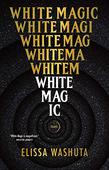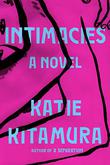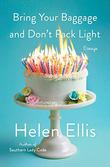Episode 219: Elissa Washuta, author of White Magic (Tin House), on writing nonfiction that challenges readers’ expectations:
 “One thing that I have learned over the course of my writing career is that if I’m going to be doing something new and unfamiliar to many of my readers—usually formally—I need to meet them somewhere. I need to have a sense of what expectations they might be bringing to the work, what potential effects my choices will have on their reading. Ultimately, I do want the reader to have a good experience with the book, I want them to be surprised. I want them to feel their curiosity engaged, I want them to feel that experience of magic that I’m trying to tell them about.…[So I] thought, what if I just tell the reader what I want them to do?…What if I just tell the reader how the book is structured?”
“One thing that I have learned over the course of my writing career is that if I’m going to be doing something new and unfamiliar to many of my readers—usually formally—I need to meet them somewhere. I need to have a sense of what expectations they might be bringing to the work, what potential effects my choices will have on their reading. Ultimately, I do want the reader to have a good experience with the book, I want them to be surprised. I want them to feel their curiosity engaged, I want them to feel that experience of magic that I’m trying to tell them about.…[So I] thought, what if I just tell the reader what I want them to do?…What if I just tell the reader how the book is structured?”
Episode 225: Katie Kitamura, author of Intimacies (Riverhead), on writing fiction in first-person point of view:
 “I always found first person for a long time very difficult and fraught. I think I worry that it would make the necessary gap between me as I am in the world and the character on the page feel like it wasn’t there. And I think I also was nervous of the kind of authority that first person can seem to have—a sense of telling this is the only version of events that you’re going to get.…For me, I think, first person really popped open when I started to think about it as a form that would allow me to put the kind of questioning, the kind of activity of a mind figuring things out, on the page, which is really I think, fundamentally, what I’m interested in—in fiction—and interested in in the first person—is to capture the kind of movement of a mind trying to figure things out. Often, in my fiction, that mind is, I think, very uncertain about things…always looking at things from multiple angles.”
“I always found first person for a long time very difficult and fraught. I think I worry that it would make the necessary gap between me as I am in the world and the character on the page feel like it wasn’t there. And I think I also was nervous of the kind of authority that first person can seem to have—a sense of telling this is the only version of events that you’re going to get.…For me, I think, first person really popped open when I started to think about it as a form that would allow me to put the kind of questioning, the kind of activity of a mind figuring things out, on the page, which is really I think, fundamentally, what I’m interested in—in fiction—and interested in in the first person—is to capture the kind of movement of a mind trying to figure things out. Often, in my fiction, that mind is, I think, very uncertain about things…always looking at things from multiple angles.”
Episode 224: Helen Ellis, author of Bring Your Baggage and Don’t Pack Light (Doubleday), on recording her own audiobook:
 “I write nonfiction like I would just tell you a story. So I know how things are supposed to sound, and it’s me sharing with you what I shared with my friends. So I really think about it, when I’m in a recording booth, like I’m just telling one of my best friends. And I am a little bit animated in how I tell a story—although I will say, several times my director had to tell me ‘slow down’ or ‘could you please step away from the mic when you yell “you dumb bitch!” ’…It happens three times, and let me tell you—I have never been so happy than to yell ‘you dumb bitch’ and call it literature.”
“I write nonfiction like I would just tell you a story. So I know how things are supposed to sound, and it’s me sharing with you what I shared with my friends. So I really think about it, when I’m in a recording booth, like I’m just telling one of my best friends. And I am a little bit animated in how I tell a story—although I will say, several times my director had to tell me ‘slow down’ or ‘could you please step away from the mic when you yell “you dumb bitch!” ’…It happens three times, and let me tell you—I have never been so happy than to yell ‘you dumb bitch’ and call it literature.”
Editor at large Megan Labrise is the host of the Fully Booked podcast. Find new episodes every Tuesday on Apple Podcasts and Spotify or at kirkusreviews.com/podcast.



































